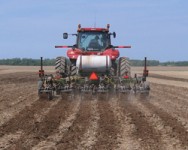Event Details
Date
December 9, 2015
Time
9:00 AM - 1:00 PM
Location
Hansen Farms
2330 Mott Rd
Stanley, NY 14561
Cost
This event is free.
Host
Cornell Vegetable ProgramCarol MacNeil
585-313-8796
email Carol MacNeil
Finger Lakes Soil Health Grower Discussion Group
December 9, 2015
GROWERS interested in improving their soil health for improved farm profitability and soil resilience with changing weather are invited to attend. This discussion group focuses on discussing options and sharing experiences related to reducing tillage, increasing cover crops, improving crop rotations, using manure/compost, and choosing/modifying equipment.
NOTE: This is a grower group. Specific NRCS, SWCD, and CCE reps have been invited to report back to their agencies/associates.
Lunch will be available to those pre-registered by noon on December 7. Contact Carol MacNeil at 585-313-8796 or email Carol.
*Directions to Hansen Farms, 2330 Mott Rd, Stanley, NY 14561: The farm office is on the southeast corner of the intersection of Mott and Old Mill Rds. From Rtes. 5 & 20 in Flint (between Geneva and Canandaigua) drive south on Old Mill Rd. 2+ miles until you come to Mott Rd.
Please note that a Western New York Soil Health Alliance of growers is formally organizing. All interested growers will be invited to become members. The goals of the Alliance are to promote the successful application of good soil health practices through shared ideas, experiences, education, research and new technology. You will be hearing more about the Alliance in the near future. You can email the Alliance.



































